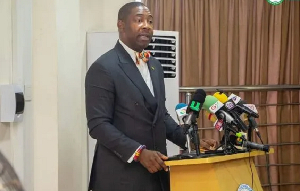The fast-paced, various SDG goals that are supposed to be achieved by 2030, which include taking care of our health, have been inaugurated in Accra on Monday, 3rd June.
This is a major breakthrough for the country as the new think tank outfit, HHSDG, is set to boost our mood, reduce stress, and improve overall well-being.
The preamble of the new think tank's purpose is a health-related nation-state project considering our freedoms, expanding liberties and fundamental rights, opportunities, and prosperity for all; and that the system of government, on whose shoulders the task of achieving these goals rests, derives their authority from the will of 'we the people.'
In his speech during the formal unveiling, Frederick Ato Armah, the Chairperson of the occasion, emphasized the fact that the think tank comprises academia, civil society, industry, government, policymakers, and communities. He also noted that we have to come together to respond to the imperative of addressing the HHSDGs from a cross-sectoral perspective.
By working together across sectors, we can address the complex health challenges and achieve the SDGs, creating a healthier and more sustainable future for all. Think tanks are meant to generate knowledge and bridge the interface between science and policy.
A speech read on behalf of the Minister for Health, Dr. Oko-Boye, by the Chief Director, mentioned the fact that health-related issues are a serious business for the government and, for that matter, he used the opportunity to thank the organizers for putting this meeting together to discuss and agree on collaborative approaches for speeding up our progress towards the attainment of the SDGs in Ghana.
He also noted that the government, in recent years, has developed and implemented several interventions to facilitate the SDGs in Ghana.
"At the policy level, we have developed the National Health Policy 2020; UHC Roadmap (2020-2030); Health Sector Medium-Term Development Plan (2020-2030); Essential Health Service Package; National Healthcare Insurance Scheme (NHIS) (digital interventions) to improve enrollment and equity; primary healthcare through improving the availability and accessibility of essential health services (NoPs with support from the World Bank) at the community level; community engagement through community-based health programs and citizens' involvement in healthcare decision-making (community scorecard); and improving partnerships and collaborations with international organizations, NGOs, and the private sector through the common management arrangements framework."
"We are also improving our health information system to generate and disseminate evidence for timely decision-making."
Mr. Manuel Dewez, who read a speech on behalf of Mr. Charles Paul Iheanacho Abani, the UN Resident Coordinator in Ghana, first congratulated the organizers of this stakeholder engagement and also for giving birth to the idea of a think tank that will focus on and address issues on health and health-related sustainable development goals.
He also noted that think tanks play a crucial role in modern society, and the importance of think tanks can be seen on several fronts, providing critical inputs and driving processes to support development, to the extent that it brings to the fore and unearths key and critical issues that are required to help reshape public policy, drive innovation, promote evidence-based decision-making, in this way contributing to a more informed and inclusive process of development.
Health News of Tuesday, 11 June 2024
Source: Frank Owusu Obimpeh, Contributor













